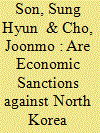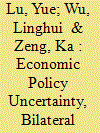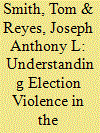|
|
|
Sort Order |
|
|
|
Items / Page
|
|
|
|
|
|
|
| Srl | Item |
| 1 |
ID:
179933


|
|
|
|
|
| Summary/Abstract |
This study analyzes the effects of the economic sanctions imposed against North Korea since 2016 on the economic well-being of North Korean cities. As a proxy for economic well-being, we use nighttime light (NTL), which is estimated from 1992 to 2019 through an inter-calibration process for DMSP/OLS and SNPP/VIIRS. We found that the total NTL growth rate of 25 major cities decreased after 2016, but that NTL itself was still getting brighter until 2009. The declines in the NTL growth rates of Pyongyang, the capital city, as well as cities bordering China and self-regenerating cities, were relatively slight. By contrast, the declines in the NTL growth rates of coal-mining cities and inland cities without sufficient production bases were greater than those in other cities. Cities in regions relying on coal-mining have traditionally accounted for a large portion of North Korea’s exports, and since they are heavily affected by sanctions, coal mining could become a vulnerable sector, which would threaten North Korea’s economic well-being.
|
|
|
|
|
|
|
|
|
|
|
|
|
|
|
|
| 2 |
ID:
179935


|
|
|
|
|
| Summary/Abstract |
This paper examines the effect of bilateral investment treaties (BITs) in promoting outward Chinese foreign direct investment (COFDI) in the presence of rising economic policy uncertainty in China’s partner countries. We postulate that the signing of BITs should help stimulate COFDI because the treaties send a credible signal to foreign investors about the host country’s intent to protect Chinese investment, and make it more difficult for the host country to violate its treaty obligations. BITs that contain rigorous investment protection and liberalization provisions, in particular, should be more likely to encourage COFDI as they directly influence Chinese investors’ expectations about the stability, predictability, and security of the host market. However, while BITs generally promote COFDI, host country economic policy uncertainty may also limit their effectiveness. This is because uncertainty tends to undermine investor confidence, trigger capital flows from high- to low-risk countries, and dampen commercial activities. Poisson pseudo-maximum likelihood (PPML) estimation models of the determinants of COFDI to 188 countries between 2003 and 2017 lend substantial support to our conjectures.
|
|
|
|
|
|
|
|
|
|
|
|
|
|
|
|
| 3 |
ID:
179936


|
|
|
|
|
| Summary/Abstract |
Since the publication of my article “Network monarchy and crises of legitimacy in Thailand” (Pacific Review, 2005), network monarchy has become an influential concept in the analysis of Thailand’s politics. Though widely adopted, the argument has also spawned rival or complementary coinings, ranging from “autonomous political networks” (Harris) to “working towards the monarchy” (Uenaldi), and the “deep state” (Merieau); as well as the “parallel state” and the “monarchized military” (Chambers and Napisa). This article revisits the argument, elaborates on the meanings of the original term and makes a case for network monarchy’s continuing salience in the Tenth Reign.
|
|
|
|
|
|
|
|
|
|
|
|
|
|
|
|
| 4 |
ID:
179937


|
|
|
| 5 |
ID:
179934


|
|
|
|
|
| Summary/Abstract |
Despite election violence being a commonly agreed upon phenomena in the Philippines, there had been a dearth in academic research in recent years, largely due to the lack of reliable sources of information. To address this, this article adapts recognised methods from studies such as Newman’s 2013 paper, together with McGrath and Gill’s 2014 research on terrorism and elections. To expose the timing of election violence, incidents were tracked relative to election dates for the period from 2004–2017, with the results indicating violence increases closer to an election date, and frequency substantially increased during the 14-year period. This is the first academic journal article since Linantud in 1998 to focus on the issue of election violence in the Philippines but through adaptive methodologies goes further to make national analysis. Furthermore, findings reveal statistically significant differences on the types of terrorist attacks and types of targets when comparing election and non-election periods. Complicating factors are explored in relation to majority of attacks attributed to ‘unknown’ actors and the complex situation during elections. The results also demonstrate that election violence in the Philippines is dominated by the New People’s Army and the use of assassination. The paper makes the case for further research and the creation of a dedicated database of election violence in the Philippines and elsewhere, and finally evaluating these few measures implemented by the government that have failed to stem election violence.
|
|
|
|
|
|
|
|
|
|
|
|
|
|
|
|
|
|
|
|
|